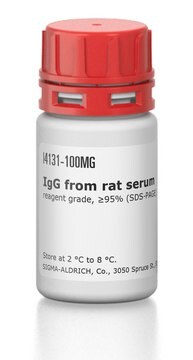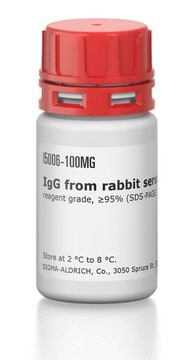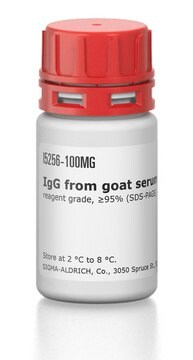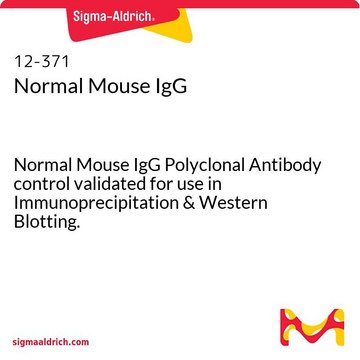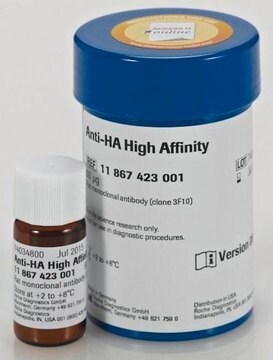Wszystkie zdjęcia(1)
Key Documents
I8015
IgG from rat serum
technical grade, ≥80% (SDS-PAGE), buffered aqueous solution
Synonim(y):
Rat IgG
Zaloguj sięWyświetlanie cen organizacyjnych i kontraktowych
About This Item
Polecane produkty
białko sprzężone
unconjugated
Poziom jakości
klasa czystości
technical grade
Próba
≥80% (SDS-PAGE)
Postać
buffered aqueous solution
Warunki transportu
dry ice
temp. przechowywania
−20°C
Szukasz podobnych produktów? Odwiedź Przewodnik dotyczący porównywania produktów
Opis ogólny
IgG (immunoglobulin G) antibody is enriched in mother′s milk. IgG is a major class of immunoglobulin. It contributes to 10−20% of plasma protein and is regarded as one of the most abundant serum protein. It consists of four subclasses: IgG1, IgG2, IgG3 and IgG4. The IgG structure possesses four polypeptide chains containing two identical γ heavy (H) chains and two identical κ or λ light (L) chains of 50kDa and 25kDa respectively. The chains are interlinked with a disulfide bond. Both the L and the H chains consist of a variable domain at the N-terminal. The C-terminal bears′ constant domains: three in H chain with a hinge region and one in the L chain. The variable region of IgG antibody is specific to antigens and is highly conserved.
Zastosowanie
IgG from rat serum has been used:
- To block programmed death ligand 1.
- As a control antibody to study the role of integrin b1 in spindle morphology
- In FACS (flow cytometry) staining
- ELISA (enzyme linked immunosorbent assay)
IgG from rat serum was used to block non-specific staining during FACS of peritoneal cells isolated from BALB/c mice. It was used as positive control in VDR staining of male and female breast tumor cells. IgG from rat serum was injected in control mice in tumor transplantation studies.
Działania biochem./fizjol.
IgG antibody has its function similar to IgM antibody in complement system activation. IgG participates in hypersensitivity type II and type III. It helps in opsonization, complement fixation and antibody-dependent cell-mediated cytotoxicity.
IgG antibody subtype is the most abundant of serum immunoglobulins of the immune system. It is secreted by B cells and is found in blood and extracellular fluids and provides protection from infections caused by bacteria, fungi and viruses. Maternal IgG is transferred to fetus through the placenta that is vital for immune defense of the neonate against infections.
Postać fizyczna
Solution in 0.01 M phosphate buffered saline, pH 7.2, containing 15 mM sodium azide
Oświadczenie o zrzeczeniu się odpowiedzialności
Unless otherwise stated in our catalog or other company documentation accompanying the product(s), our products are intended for research use only and are not to be used for any other purpose, which includes but is not limited to, unauthorized commercial uses, in vitro diagnostic uses, ex vivo or in vivo therapeutic uses or any type of consumption or application to humans or animals.
This page may contain text that has been machine translated.
Kod klasy składowania
12 - Non Combustible Liquids
Klasa zagrożenia wodnego (WGK)
nwg
Temperatura zapłonu (°F)
Not applicable
Temperatura zapłonu (°C)
Not applicable
Certyfikaty analizy (CoA)
Poszukaj Certyfikaty analizy (CoA), wpisując numer partii/serii produktów. Numery serii i partii można znaleźć na etykiecie produktu po słowach „seria” lub „partia”.
Masz już ten produkt?
Dokumenty związane z niedawno zakupionymi produktami zostały zamieszczone w Bibliotece dokumentów.
Klienci oglądali również te produkty
The Laboratory Rat (2005)
Designing Antibodies, 216-216 (2012)
Awtar Krishan et al.
Cytometry. Part B, Clinical cytometry, 58(1), 53-60 (2004-03-03)
The present study was undertaken for quantitation of androgen (AR) and vitamin D (VDR) receptor expression in human male and female breast tumors by flow cytometry. Nuclei isolated from sections of paraffin-embedded tumors by pepsin digestion were treated for antigen
Proteasome inhibition with bortezomib depletes plasma cells and autoantibodies in experimental autoimmune myasthenia gravis
Gomez AM, et al.
Journal of Immunology, 1002539-1002539 (2011)
A Coronin 1--Dependent Decision Switch in Juvenile Mice Determines the Population of the Peripheral Naive T Cell Compartment
Lang MJ, et al.
Journal of Immunology, ji1700438-ji1700438 (2017)
Nasz zespół naukowców ma doświadczenie we wszystkich obszarach badań, w tym w naukach przyrodniczych, materiałoznawstwie, syntezie chemicznej, chromatografii, analityce i wielu innych dziedzinach.
Skontaktuj się z zespołem ds. pomocy technicznej